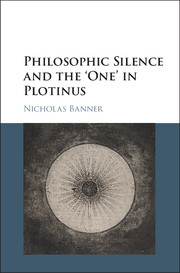Book contents
- Frontmatter
- Contents
- Preface
- List of Abbreviations
- Introduction
- PART I The Cultural Roots of Platonist Philosophic Silence
- PART II The Transcendent Absolute, the Ineffable and Plotinian Poetics of Transcendence
- Conclusion
- Appendices
- Appendix A The Plotinian Idea of Tradition and ‘Platonism’
- Appendix B Esoteric Hermeneutics, Plato and Aristotle in Plotinus
- Appendix C Some Useful Notes on Plotinian Metaphysics
- Appendix D Modern Theories of Philosophic Silence
- Select Primary Bibliography
- Secondary Bibliography
- Index
Appendix D - Modern Theories of Philosophic Silence
from Appendices
Published online by Cambridge University Press: 16 March 2018
- Frontmatter
- Contents
- Preface
- List of Abbreviations
- Introduction
- PART I The Cultural Roots of Platonist Philosophic Silence
- PART II The Transcendent Absolute, the Ineffable and Plotinian Poetics of Transcendence
- Conclusion
- Appendices
- Appendix A The Plotinian Idea of Tradition and ‘Platonism’
- Appendix B Esoteric Hermeneutics, Plato and Aristotle in Plotinus
- Appendix C Some Useful Notes on Plotinian Metaphysics
- Appendix D Modern Theories of Philosophic Silence
- Select Primary Bibliography
- Secondary Bibliography
- Index
Summary
The Tübingenschule and the (Anti-)Esotericist Debate
The name ‘Tübingen School’ mainly refers to a scholarly approach to Plato, rather than to later Platonists, but it is in some senses a revival of Late Platonist hermeneutics of Plato in a thoroughly modern guise, and significant for this reason to the study of Platonist philosophic silence more generally. The Tübingen reading of Plato is further significant in the context of ancient philosophic silence because it is an esotericist reading of Plato – that is to say, these scholars read Plato as though he did indeed write more Platonico, hiding at least some of his true doctines – and is thus embroiled in the problematics of the self-hiding secret, one of the major interpretative difficulties when dealing with Platonist philosophic silence.
As mentioned above, the idea that Plato wrote in this way, hiding his true doctrine in some fashion, has been an assumption of many, or even most readers since late antiquity until the eighteenth century, and it has only been with the advent of the modern analytical approach that this reading has been widely called into question. Harold Cherniss took an influential reductionist stance on which sources of evidence are admissible in attempting to discern what Plato meant to say: Cherniss maintains, essentially, that only the dialogues themselves should be considered as evidence of Plato's views. The ‘Esoterics’, on the other hand, argue that the strong testimony of Aristotle and others that the lecture ‘On the Good’ presented an oral component of Plato's teaching cannot be ignored. Insofar as regards the history of Platonist interpretation, this is certainly true; as Chapter 2 of the present work emphasises, the Platonic ‘oral teaching’ had a long interpretative life in later Platonist metaphysics, and served as a thematic locus for Platonist silence.
It is impossible to say with precision when the reputation of Plato as an author with a secret teaching arose. Tigerstedt has correctly pointed out that there is no direct evidence for the idea of a secret Platonic doctrine before the imperial period, a fact which he adduces to a thoroughgoing argument against a secret Platonic doctrine.
- Type
- Chapter
- Information
- Philosophic Silence and the ‘One' in Plotinus , pp. 266 - 273Publisher: Cambridge University PressPrint publication year: 2018



